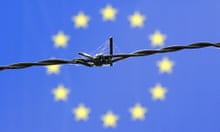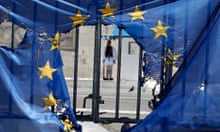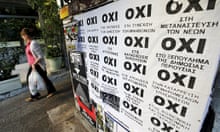Greece needs €50bn-€60bn (£35bn-£42bn) of extra funds over the next three years and large-scale debt relief to create “a breathing space”, says the International Monetary Fund. In Athens, the Greek prime minister, Alexis Tsipras, could be forgiven for shouting: “I told you so.” Debt relief has been a central plank of his demands from the day he was elected in January.
Tsipras might also curse the IMF for making its declaration only now, three days before the referendum. The IMF has been muttering about debt relief for Greece for months but behind-the-scenes briefings don’t carry the same clout as an official publication.
Why didn’t the IMF shout earlier? First, the organisation was probably embarrassed by its role in the flawed and inadequate first bailout of 2010. Debt relief should have happened at that time and the IMF should have insisted upon it. Instead, Greece’s private sector creditors – largely European banks – were bailed out and risky Greek debt was shifted onto eurozone taxpayers and institutions.
Second, Tsipras got his strategy hopelessly wrong. Back in the spring, and even in the last few weeks, there was clearly an opportunity for Greece to drive a wedge between the IMF and hardliners in Germany.
If Tsipras could have persuaded the IMF to put debt relief onto the negotiating agenda, other pieces of the jigsaw might have fallen into place. He might have found it easier to sell to his own electorate a version of the austerity programme that, belatedly, he accepted in a letter to the European commission this week. If the IMF was trying to push him in that direction, Tsipras refused to jump.
Instead, the referendum will happen this Sunday – it will be a bizarre vote on proposals the creditors say are no longer on the table. It is conceivable that the attempt by the IMF to bang heads together could influence the outcome. More likely, both sides will see support for their own positions.
The no supporters will say Tsipras was right all along to complain about the unsustainability of the debt burden and the need for relief. The yes camp will argue that Syriza’s political naivety prevented a deal being done before damaging capital controls arrived.
BP’s costly deepwater dividend
In the aftermath of the Gulf of Mexico disaster in 2010, BP made what it thought was a conservative provision for the fines, damages and litigation costs that would follow – $38bn (£24bn). Now, after Thursday’s $18.7bn settlement of all federal and state claims, comes a figure that is close to a final tally: $53.8bn. Throw in a few legal loose ends and call it $55bn.
The lower guess was made fanciful long before Thursday, of course. The $18.7bn settlement was roughly in line with revised expectations. BP’s share price rose 4% on relief and also because the bill will be paid in instalments until 2033. Roughly speaking, BP will pay $1.1bn a year for 18 years. Put like that, it sounds affordable, shareholders concluded.
In a sense, they’re right. The current dividend (restored the year after Deepwater Horizon at a much lower level) costs $6bn a year. The biggest threat to the divi is now the lower oil price, and its effect on profits, not the legal fights.
For true optimists, legal clarity means would-be bidders might be attracted to BP. Don’t bank on it. The list of credible suitors is short. BP still comes with heavy political risks in Russia. And, at the current oil price, most oil majors are too busy cutting their own costs to take on the challenge of fixing a rival’s.
The American dream
Sir Charles Dunstone’s last US adventure was a splendid success. Carphone Warehouse collected a $1bn windfall in 2011 when local partner Best Buy bought it out of a joint venture. Since then, Carphone has been merged with Dixons, which has a poorer pedigree in the US. Back in the 1990s, Dixons lost a packet by owning the Silo chain and failing to adapt to American tastes.
Thankfully, the new US expedition is more Carphone than Dixons. It’s a 50/50 joint venture with Sprint, the third-largest mobile operator in the US. As with the Best Buy arrangement, the idea is that Carphone brings fresh ideas, technology and retailing nous to the job of flogging mobile phone contracts. About 20 shops will open as a trial; if they go well, up to 500 will follow. Dixons Carphone will also act as a sort of super-consultant to Sprint’s established estate of 1,100 stores.
It is odd that these US companies feel they have to phone Dunstone when they’re in a retailing rut. But Dixons Carphone is right to take up a low-risk offer. Success is not guaranteed but an investment of $32m for a 50% interest in the new venture means the price of entry is reasonable.









Comments (…)
Sign in or create your Guardian account to join the discussion